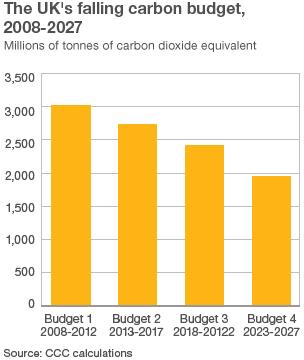Chris Huhne briefs MPs on long-term carbon target
- Published
Energy Secretary Chris Huhne: "We intent to keep our carbon trading options open"
Chris Huhne has committed the UK to halving carbon emissions by 2025, from 1990 levels, and changing the way that the country produces energy.
The energy secretary - who is battling claims he asked someone close to him to take speeding points for him - briefed MPs on the UK's fourth "carbon budget".
He said there would be a review of progress in early 2014 to ensure the UK's targets were in line with Europe.
Labour accused him of a "go-slow" on green progress.
'Green growth'
Addressing the Commons, Mr Huhne said the decision would be reviewed in three years to ensure the targets are "aligned" with other members of the European Union, which he said made "pragmatic sense".
Countering claims that energy consumers would face price hikes as a result of the measures, he said it would result in no additional cost for the consumers during this parliament.
He also revealed the government was "working up a package of measures" to be announced by the end of the year to help energy-intensive industries "adjust" to the transformation while remaining competitive.
Mr Huhne told MPs the budget would "set Britain on the path to green growth".
"It will establish our competitive advantage in the most rapidly growing sectors of the world economy," he said.
"It will generate jobs and export opportunities in these sectors - maintain energy security and protect our economy from oil price volatility. It's a framework for growth, not just for action on climate but for growth and prosperity."
The Climate Change Act 2008 sets a target to reduce greenhouse gas emissions in the UK by at least 80% on 1990 levels by 2050, and also requires the government to set carbon budgets - limits on emissions - for consecutive five-year periods.
These carbon budgets must be set at least three budget periods in advance, and the fourth carbon budget - the limit on emissions from 2023 to 2027 - has to be set in law by June 2011.
The 2027 targets follow recommendations from the government's official advisory body, the Committee on Climate Change (CCC).
Mr Huhne said he agreed with the committee that net emissions over this period should not exceed 1,950 million tonnes of carbon dioxide equivalent - a 50% reduction from 1990 levels.
"We will aim to reduce emissions domestically as far as is practicable and affordable," he said.
"But we also intend to keep our carbon trading options open to maintain maximum flexibility and minimise costs in the medium term. Given the uncertainty of looking so far ahead, this is a pragmatic approach."
'Delighted'
Shadow climate change secretary Meg Hillier accused Mr Huhne of a "go-slow" on green progress, saying that the "long-awaited Green Investment Bank" was unable to borrow until 2015, pointing out: "So no rush there."
She said meeting carbon targets was impossible without cutting domestic emissions, adding: "Policy needs to be joined up if we are going to get the green industrial revolution we need in this country."
But CCC chief executive, David Kennedy, said he was "delighted" the government had accepted its recommendations and that it would "ensure that we make the right investment choices, maximising long-term growth and reducing our reliance on imported fossil fuels".

However, Green MP Caroline Lucas remained critical of the announcement which "risked being a sham", she said, citing the "slipped in a concessionary review clause which will allow the government to backtrack on the fourth carbon budget".
She concluded: "On the crucial issue of how we now meet the targets, the government has shunned the CCC's recommendation that the budget should be met through domestic action alone.
"Allowing the use of trading mechanisms such as offsetting essentially means outsourcing our emission reduction responsibilities to other countries - thereby weakening the drive to achieve more green technologies and industries, with all the jobs those can bring, here in the UK."
But Matthew Spencer, director of the Green Alliance, suggested the government would find it hard to weaken the budget in 2014 without facing a legal challenge.
"The 2014 review is very unlikely to change anything since the EU will not have decided on its trajectory by then," he said.
"The Prime Minister has shown real leadership, and we should celebrate the fact that the UK can now become the lead location for investors in low carbon infrastructure and technology and maximise the advantage for UK business."
Friends of the Earth welcomed the budget but said the "get-out clause" could undermine business confidence in investing in a greener future.
Consumer watchdog Which? has expressed concern that domestic customers will not be similarly shielded from price rises.
The Committee on Climate Change has forecast that to meet emissions targets the average household fuel bill will go up by £1 a week until 2020 when it will plateau out with no major rises after that.
Mr Huhne faced taunts from some Labour MPs over allegations he asked someone close to him to take speeding points on his driving licence - which are firmly denied by the minister.
Labour's Geraint Davies asked if the carbon targets "would be helped by lowering the speeding limit for cars or does he think the speeding limit for cars should be raised like the transport secretary and presumably his wife?"
Mr Huhne replied that the question was "well above his pay grade".
- Published10 May 2011
- Published9 May 2011
- Published16 September 2010
- Published19 July 2010
- Published30 June 2010